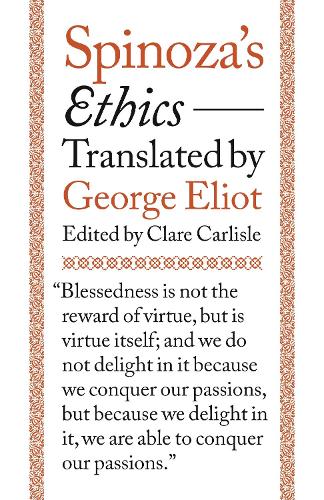
Spinoza's Ethics
(Paperback)
Available Formats
Publishing Details
Spinoza's Ethics
By (Author) Benedictus de Spinoza
Translated by George Eliot
Edited by Clare Carlisle
Princeton University Press
Princeton University Press
24th March 2020
United States
Classifications
General
Non Fiction
Literature: history and criticism
170
Physical Properties
Paperback
384
Width 140mm, Height 216mm
Description
An authoritative edition of George Eliot's elegant translation of Spinoza's greatest philosophical work In 1856, Marian Evans completed her translation of Benedict de Spinoza's Ethics while living in Berlin with the philosopher and critic George Henry Lewes. This would have become the first edition of Spinoza's controversial masterpiece in Engli
Reviews
"Carlisle has done a beautiful job editing George Eliots translation and providing a scholarly apparatus. . . . This is the edition that George Eliots translation of Spinozas Ethics has long deserved, and that we have long needed."---Steven Nadler, La Vie des Ides
"This edition will be of most interest to scholars of Eliot seeking more insight into the influence of Spinozas thought on her literary work." * Choice *
"Readers and lovers of George Eliot owe a large debt of gratitude to Clare Carlisle and Princeton University Press for their fine new edition of Eliots translation of Benedict de Spinozas Ethics (1677)."---Thomas Albrecht, Women's Writing
"For this volume to be truly worthwhile, the significance of the translation must be revealed, and to do this, the biographical, literary, and philosophical context in which the translation came to be needs to be explored and analysed. And Carlisle succeeds splendidly in all these respects."---Michael Della Rocca, Mind
"Carlisle offers us an outstanding introductory essay in which she contextualizes the slow travel of Spinoza among English intellectuals in the early to mid-decades of the nineteenth century. . . . With her philosophical and poetic sensitivity to these two seventeenth- and nineteenth-century thinkers, Carlisle reminds us that rather than tracing direct lines of influence, todays historical criticism might be ready to think in terms of cosmic affinities. . . . The notion of a spiritual friendship is not what I expected to find in this new edition of a long-translated Spinoza, but Carlisle inspires and challenges us to recognize and value the subtle power of a certain tie between two human beings, which is somehow sacred, a rich source of meaning."---Ilana M. Blumberg, George EliotGeorge Henry Lewes Studies
Author Bio
Clare Carlisle is Reader in Philosophy and Theology at King's College London and a regular contributor to the Times Literary Supplement. Her books include Philosopher of the Heart: The Restless Life of Sren Kierkegaard, On Habit, and Kierkegaard's Philosophy of Becoming. She lives in London.
